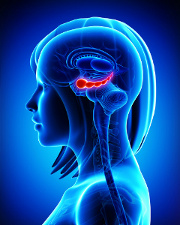The Power of Choice: Two Pathways in the Brain
Have you ever had regrets over anything? There are many occasions when acting on impulse is a GOOD thing: like buying your girlfriend flowers on the way home from work. However for those ruled by impulse something as simple as shopping can be a dangerous activity: the shopping basket is overflowing and the credit card is empty.
Impulsiveness can create difficulty making long term plans even for pleasure. It can become challenging to control the emotions, either good or bad. In this mode thinking logically and carefully about decisions is nearly impossible.
We have two major brain pathways to cope with stress. We have the reflex impulse pathway operated by the amygdala and the higher brain pathway managed by the hippocampus.
The reflex pathway is the one that can save our own, or someone else’s life. This is for a situation where our survival instincts must take over, so we can act fast, much faster than conscious thought. Think of the father jumping into a foaming river to rescue his son from drowning. Or on the more flippant side, do you have the wherewithal to snap up a good buy? It also comes in pretty handy if you are goalkeeper for your soccer team.
 The Hippocampus
The Hippocampus
When the urgency is not that great and we have the luxury of time, we use our higher brain pathway called the hippocampus to make decisions about our welfare. This type of intelligence is for careful planning: when we want to think things over in a logical and sequential way, because if we get it wrong, the price is going to be very, very high: Am I marrying the right person, buying the right house, taking the right 200,000 dollar course at university?
Exercising the Power of Choice
This higher brain pathway has another job. Using its’ better judgment, it must at times take control of our impulses and instincts. Our instinct pathway is very powerful and always on the ready, but can be prone to misjudgment and overreaction. You are heavily invested in stocks that are plummeting and your instinct is to get out, sell your stocks in a hurry. But your broker says, ‘No, wait, don’t panic, the market will correct itself, hang in there. Go for the long haul.’
If you listen to your broker, you are using your higher brain pathway, also called your hippocampus, to override and calm down your instinct pathway, operated by the amygdala. Only time will tell whether you should have listened to your gut instincts, or to your broker!
Be that as it may, what is important here is that we have two brain pathways for coping with stress. Every time we get stressed it’s a judgment call as to which one we will be using. The ideal state of being for everyday living is that our higher brain pathway is in charge, controlling the instinct pathway. If this is the state of play, we have good coping skills, we feel resilient, our emotions are under control and our confidence rides high.
Burnout, the stresses and strains of life, traumatic experiences, aging and ill health can all upset this delicate neurological balance between our two stress pathways, tipping the balance in favor of impulsive overreaction. This can cause us to feel stuck in an agitated, anxious, on edge and overwhelmed state of mind
The answer lies in a brain body technique that quickly re-establishes order and balance in our brain pathways and return us to the more desirable and pleasant thriving state of natural resilience.




Leave a Reply
Want to join the discussion?Feel free to contribute!